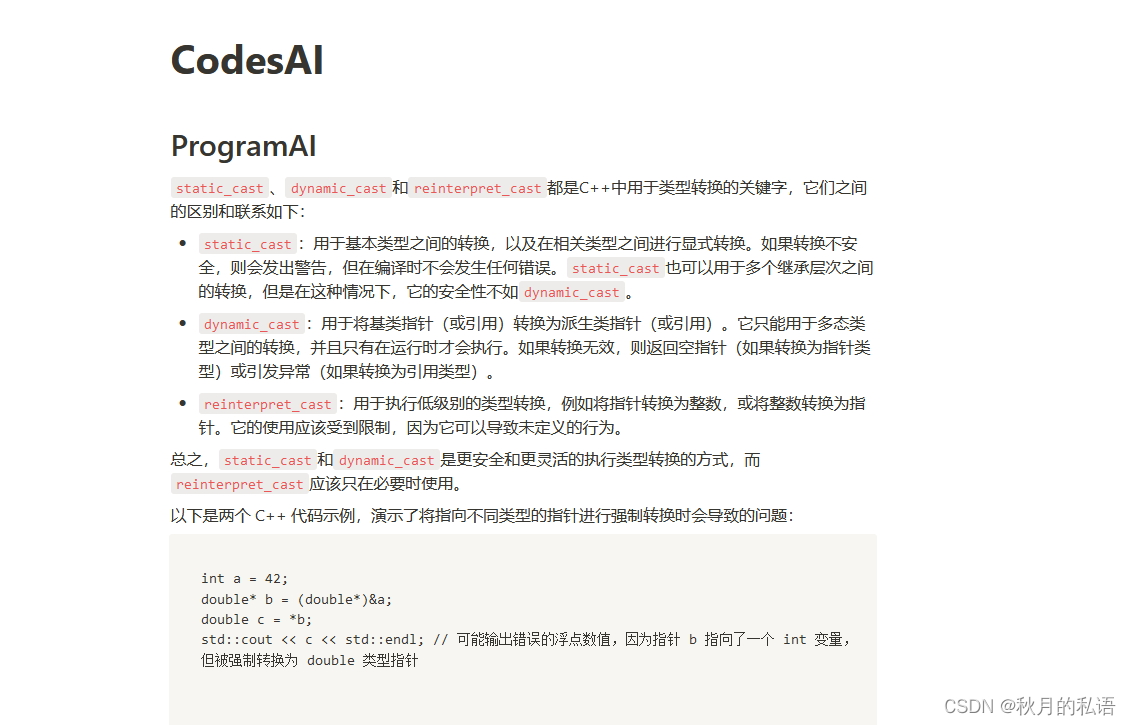static_cast、dynamic_cast和reinterpret_cast区别和联系
其实网上相关的资料不少,但是能够说清楚明白这个问题的也不多。
于是,我尝试着问了一下AI,感觉回答还可以,但是需要更多的资料验证。

让我们先看看AI是怎么回答这个问题的。
static_cast、dynamic_cast和reinterpret_cast都是C++中用于类型转换的关键字,它们之间的区别和联系如下:
static_cast:用于基本类型之间的转换,以及在相关类型之间进行显式转换。如果转换不安全,则会发出警告,但在编译时不会发生任何错误。static_cast也可以用于多个继承层次之间的转换,但是在这种情况下,它的安全性不如dynamic_cast。dynamic_cast:用于将基类指针(或引用)转换为派生类指针(或引用)。它只能用于多态类型之间的转换,并且只有在运行时才会执行。如果转换无效,则返回空指针(如果转换为指针类型)或引发异常(如果转换为引用类型)。reinterpret_cast:用于执行低级别的类型转换,例如将指针转换为整数,或将整数转换为指针。它的使用应该受到限制,因为它可以导致未定义的行为。
总之,static_cast和dynamic_cast是更安全和更灵活的执行类型转换的方式,而reinterpret_cast应该只在必要时使用。
以下是两个 C++ 代码示例,演示了将指向不同类型的指针进行强制转换时会导致的问题:
int a = 42;
double* b = (double*)&a;
double c = *b;
std::cout << c << std::endl; // 可能输出错误的浮点数值,因为指针 b 指向了一个 int 变量,但被强制转换为 double 类型指针
struct A { int x; };
struct B { int y; };
A a;
B* b = (B*)&a;
int c = b->y;
std::cout << c << std::endl; // 可能输出意料之外的值,因为结构体 A 和 B 中的成员变量不同,但被强制转换为 B* 类型指针
在这些情况下,强制转换可能会导致未定义的行为,例如访问无效的内存位置或引发段错误。因此,应避免在这些情况下使用强制转换,而应使用static_cast或dynamic_cast,或者重新设计应用程序以避免需要进行此类转换。
下面我加入了自己实测的代码:
#include <iostream>
class CBase
{
public:
CBase();
~CBase();
private:
};
CBase::CBase()
{
}
CBase::~CBase()
{
}
class CInherit : public CBase
{
public:
CInherit();
~CInherit();
private:
};
CInherit::CInherit()
{
}
CInherit::~CInherit()
{
}
class CAnotherBase
{
public:
CAnotherBase();
~CAnotherBase();
private:
};
CAnotherBase::CAnotherBase()
{
}
CAnotherBase::~CAnotherBase()
{
}
int main()
{
int nInt = 0;
double dDouble = 0.0;
CBase base;
CInherit inherit;
CAnotherBase anotherBase;
CBase* pBase = &base;
CInherit* pInherit = &inherit;
CAnotherBase* pAnotherBase = &anotherBase;
dDouble = static_cast<double>(nInt);
nInt = static_cast<int>(dDouble);
//dDouble = dynamic_cast<double> (nInt); //失败
//nInt = dynamic_cast<int>(dDouble); //失败
pBase = static_cast<CBase*>(pInherit);
pInherit = static_cast<CInherit*>(pBase);
pBase = dynamic_cast<CBase*>(pInherit);
//pInherit = dynamic_cast<CInherit*>(pBase); //失败
//pAnotherBase = static_cast<CAnotherBase*>(pBase); //失败
//pAnotherBase = dynamic_cast<CAnotherBase*>(pBase); //失败
std::cout << "Hello World!\n";
}失败部分是关键,需要逐个看,思考,时间问题就不总结了,欢迎交流与讨论。
